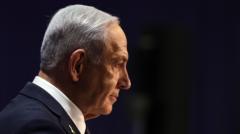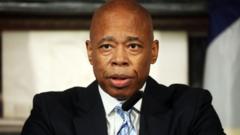Israeli Prime Minister Benjamin Netanyahu has condemned the ongoing investigation into his aides' connections with Qatar as a "witch hunt." The arrests of his close adviser Yonatan Urich and former spokesman Eli Feldstein, amid allegations of bribery and money laundering, have sparked debates about political interference and accountability as protests against Netanyahu's policies escalate.
Netanyahu Labels Qatar Probe a "Witch Hunt" as His Aides Face Arrests

Netanyahu Labels Qatar Probe a "Witch Hunt" as His Aides Face Arrests
Amid growing controversies, Israeli Prime Minister Benjamin Netanyahu vehemently defends his aides against an investigation involving alleged ties to Qatar, while accusations of political motivations resonate through Israeli politics.
Israeli Prime Minister Benjamin Netanyahu has publicly denounced an investigation into potential links between his aides and Qatar as a "witch hunt." His response comes after the police arrested two of his close associates—adviser Yonatan Urich and former spokesman Eli Feldstein—over alleged payments from the Gulf state, as part of a probe that many in Israel have dubbed "Qatar-gate." Both men have denied wrongdoing and have claimed their innocence during this politically charged investigation.
Netanyahu himself, who has not been named as a suspect, has gone on record accusing the authorities of holding his aides as "hostages" and asserted, "There is no case." His remarks not only reflect his defense of his aides but are also an affront to the integrity of the investigation. A representative from Qatar joined the fray, labeled the probe a "smear campaign," particularly given Qatar's role as a key mediator between Israel and Hamas amidst the ongoing conflict.
As protests intensify against Netanyahu's government, fueled by various controversial policies—including a resumed offensive against Hamas, the dismissal of the Shin Bet security chief, and a contentious judiciary overhaul—the timing of the probe raises questions about its implications on Israeli politics.
On Monday, Israeli police announced the arrests but declined to provide further details due to a court-imposed gag order. Local media reports indicated that Urich and Feldstein were being investigated for contacts with foreign agents, money laundering, and other serious allegations. Following his police testimony, Netanyahu took to social media, labeling the investigation overtly political and expressing disbelief at the extent to which it has evolved.
In legal proceedings, a judge extended the detention of Urich and Feldstein, stating there were “reasonable suspicions” warranting further investigation, while acknowledging the involvement of a US lobbying firm purportedly working for Qatar. The details of the case seem to paint a picture of potential misconduct but also reveal the contentious political landscape surrounding it.
The Qatari official's defense of its interests in Gaza may complicate matters further, as Qatar has historically provided aid to the region, which some critics argue has enabled Hamas’ resilience. Nevertheless, the dynamic role of Qatar as a mediator has garnered both praise and skepticism within Israel, making the entire situation ripe for multifaceted political interpretations.
Additionally, Netanyahu has raised concerns that the investigation is an effort to save the ousted Shin Bet chief and could signify attempts to undermine his administration, emphasizing a narrative of political vendetta against right-wing leadership. Meanwhile, the Israeli Supreme Court has intervened regarding the security chief's dismissal, indicating potential legal ramifications for the prime minister’s actions moving forward.
With the political stakes this high and public discontent boiling over, the reported developments around the so-called "Qatar-gate" are likely to reverberate throughout the complexities of Israeli governance and foreign relations in the coming weeks.



















